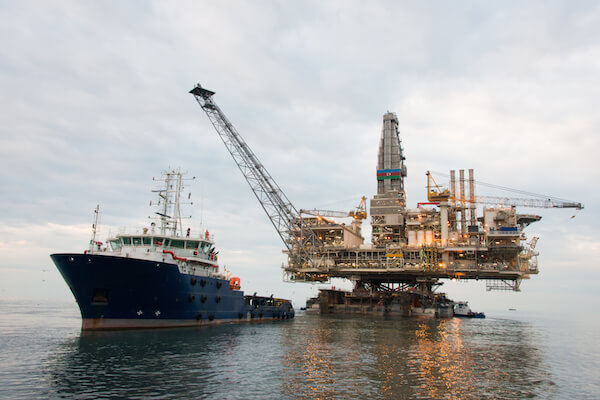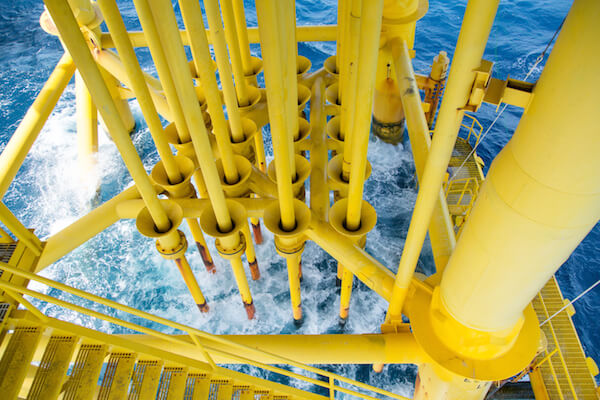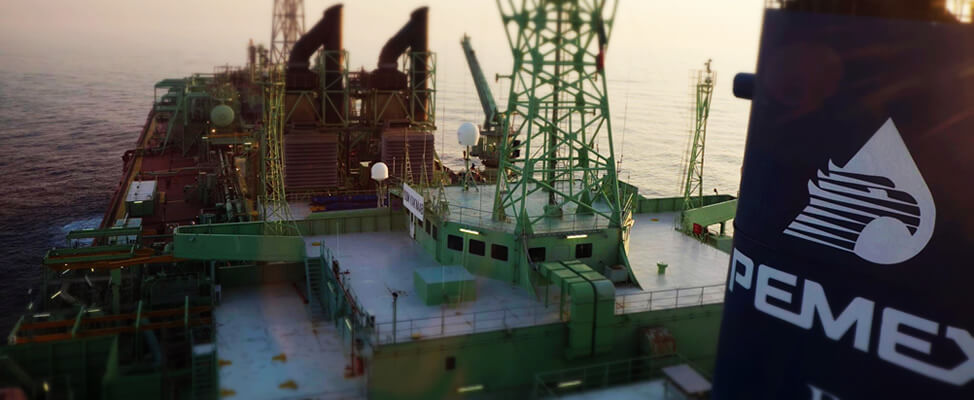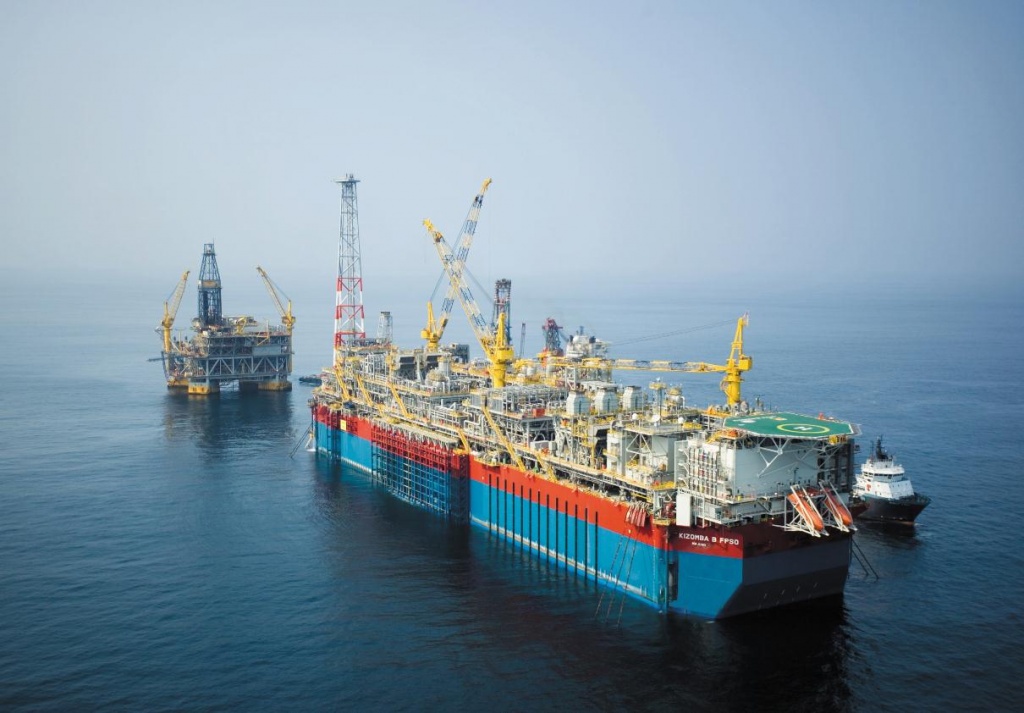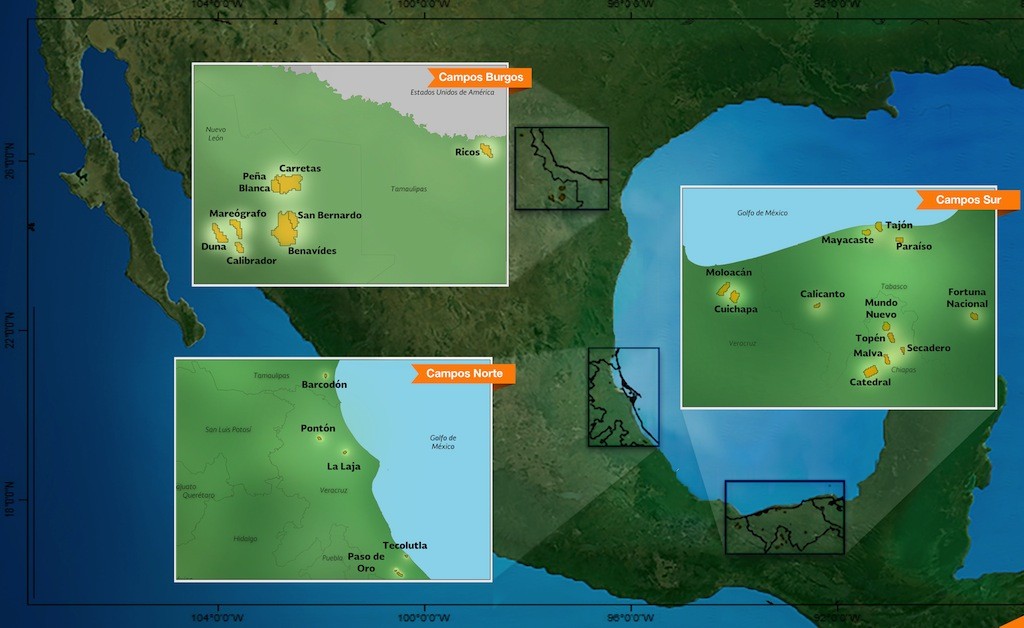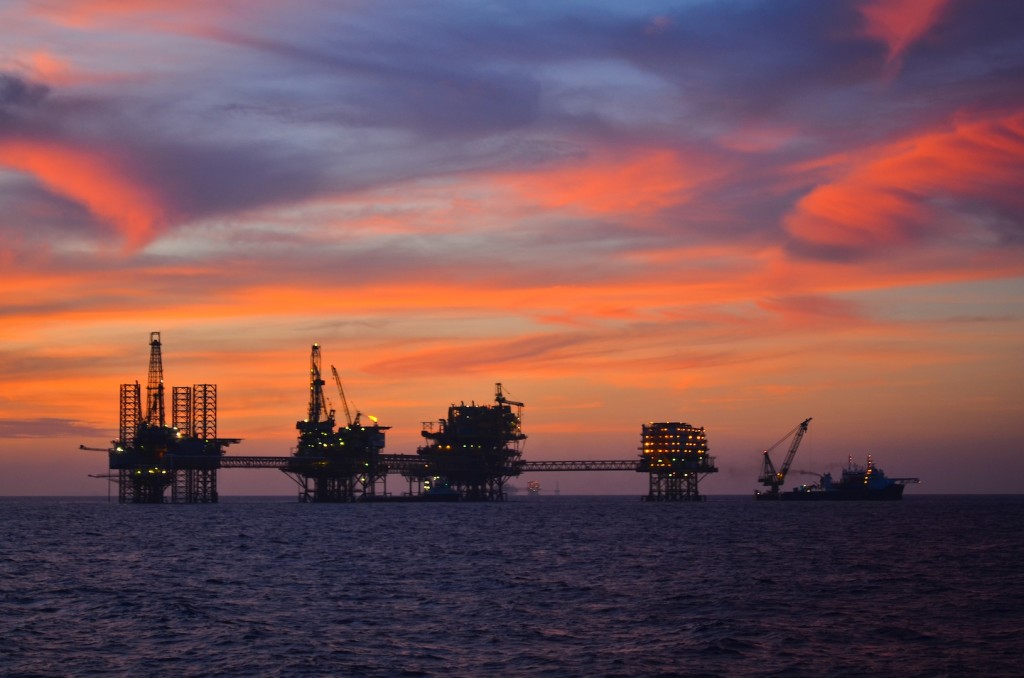Tag Archive for: PEMEX
Over 20 Oil Companies Register for Auction Mexican Gulf Blocks
/NewsFor the auction of 10 blocks in waters of the Gulf of Mexico 21 oil companies have registered to participate, among them Spanish Repsol, Norwegian Statoil and French Total, together with Mexican Pemex, it was known today.
British BP, Anglo-Dutch Shell, Chevron and Exxon Mobil, both of the United States have also registered.
These four international megacorporations, which in the past made up the influential group known as The Seven Sisters, and for decades were owners of the Mexican crude, attempt to recover the exploitation of oil fields, says daily La Jornada.
Through the license contract, the National Commission of Hydrocarbons (CNH) allows winner companies to exploit oil deposits.
Up to 1938, before nationalization of the oil industry, decreed by president Lazaro Cardenas, seven foreign companies -five of the U.S. and two British- were owners of Mexican oil.
As it transcended, the seven transnationals were baptized by Enrico Mattei, considered father of the Italian energy industry, as the Seven Sisters.
The opening date for presentation of proposals for handing concessions on exploitation of a máximum period of 50 years of the 10 auctioned blocks, located in deep waters of the Gulf of Mexico, will be set on December 5, 2016.
Copyright: Prensa Latina
Exxon, Total, Chevron In Talks With Pemex On Gulf Prospects
/NewsPetroleos Mexicanos is in talks with Exxon Mobil Corp., Total SA and Chevron Corp. as Mexico’s struggling state-run oil producer seeks partners to develop deepwater crude in the Gulf of Mexico.
Pemex may also start discussions with Oslo-based Statoil ASA, according to company press officials who asked not to be named because of policy. Pemex seeks Areas of Mutual Interest agreements to evaluate whether the companies have opportunities to work together in offshore areas.
The talks would indicate the world’s oil majors are interested in partnering with Pemex to produce the country’s underdeveloped crude reserves or bid with Mexico’s state-owned operator in the country’s first-ever deep water auctions in December. Pemex, which deferred investments in deepwater fields this year amid a $5.5 billion budget cut, has reiterated that it seeks to partner with the world’s largest producers to develop Mexico’s crude reserves, estimated by the country’s oil regulator at the equivalent of 10.24 billion barrels of crude at the end of last year.
“They will use the tools in the energy reform to do this,” Nymia Almeida, a senior credit officer for Moody’s, said at a conference in New York, when asked about Pemex forming partnerships and selling assets, which the company intends to do. “Any deal would be better than none, even if it starts little by little.”
Hakon Fonseca Nordang, head of communication for Statoil in the U.S. and Mexico, declined to comment on any discussions, saying that Statoil and Pemex have for years had a General Cooperation Agreement involving research and technology exchange between the two companies. Scott Silvestri, an Exxon spokesman, declined to comment, as did Isabel Ordonez, a spokeswoman for Chevron in Latin America.
Deepwater Auction
Mexico hopes to raise $44 billion in investment in its first-ever sale of deepwater areas in the Gulf of Mexico, scheduled for Dec. 5. The country will auction 10 areas in the Perdido area near the maritime border with the U.S. and in the southern gulf’s Cuenca Salina.
Seventy-six percent of the country’s prospective oil resources are located in the deep waters of the Gulf of Mexico, according to Energy Minister Pedro Joaquin Coldwell. Pemex, Statoil, Chevron and Exxon are among 16 companies that are in the process to qualify to bid in the deep water auctions
Copyright: Rig Zone
Mexico’s Pemex signs MOUs with Arab oil companies
/NewsMexican state-owned energy company Petroleos Mexicanos signed two memorandums of understanding Tuesday with oil companies from the United Arab Emirates.The two MOUs, signed within the context of Mexican President Enrique Peña Nieto’s visit to several Persian Gulf nations, are in addition to a separate agreement inked in Saudi Arabia, Pemex said in a statement.
Under the terms of one MOU with Mubadala Petroleum, the companies will explore potential upstream (exploration and production) and primary midstream (liquefaction and transport) projects in Mexico’s energy sector.
They also will study the potential for cooperating on infrastructure projects, including one in the Salina Cruz area of the southern Mexican state of Oaxaca that would involve an investment outlay totaling more than $4 billion, Pemex said.
Under the terms of the agreement, the two companies also will explore potential cooperation in cogeneration projects.
A second MOU was signed with the company ADNOC and calls for the exchange of best operating practices, including training in areas such as the processing and handling of liquefied natural gas.
Lastly, the MOU with Saudi Arabian company Saudi Aramco lays the groundwork for a dialogue aimed at “exploring different areas of cooperation,” such as upstream and downstream (refining and marketing) operations and support services.
Pemex CEO Emilio Lozoya, who is accompanying Peña Nieto on the visit, signed the three MOUs. EFE
Copyright: Fox News
New provisions for the use of associated natural gas
/Our CoreThe new technical provisions emitted by CNH (National Hydrocarbons Commission) came into effect January 8th, which include the use and maximization of the economic value of associated natural gas in the exploration and extraction of hydrocarbons.
The main objective of these provisions is the structuring of programs based on procedures, requirements and criteria to define the goal of taking advantage of natural gas associated by holders of allocations and contracts for exploration and extraction of hydrocarbons, both in non-conventional and conventional deposits.
For this purpose, the CNH will convene through hearings Petroleos Mexicanos (Pemex) that jointly review manifests or use programs delivered to the Commission. Whatever is derived from the review, a work plan will be established so that in 2016 Pemex can present the Programas de Aprovechamiento de Gas Natural Asociado for each current assignment. PEMEX may refer to the Commission for consideration, modifications to use with the Programas de Aprovechamiento de Gas Natural Asociado as a result of the presentation for approval or modification of plans.
Finally, it is important to mention that these provisions are of general observance and compulsory for oil operators carrying out activities of exploration and extraction of hydrocarbons, which involve extraction and utilization of associated natural gas.
4th Call: Round 1 Bidding Guidelines and Model Contract
/NewsWe are pleased to report that today Deceber 17th of 2015, The Energy Ministry (SENER) published the bidding guidelines and model contract for the 4th phase of Round 1, which provides the awarding for the exploration and extraction of hydrocarbons in Deep Waters, which will be held in the 3rd quarter of 2016.
In this 4th edition the National Hydrocarbons Commission, shall tender 10 areas located in the Gulf of Mexico; 6 in the region of the “Cuenca Salina”, and 4 in the call “Cinturón Perdido de Plegado”, where depths range from 500 meters to 3,000 meters of water depth.
The operating companies will combine assets 10,000 million (MDD), or equity account of 2,000 million dollars, in addition to experience in drilling at least 1,000 meters deep between 2011-2015 and investments in deepwater projects for 2,000 million dollars.
Meanwhile SENER already preparing the fifth stage of the Round One that will include areas with unconventional resources such as Chicontepec and Tampico Misantla.
For more information consult www.ronda1.gob.mx
Transparency is Key to Improving the Outlook for Mexico’s Deepwater Block Auction, says GlobalData Analyst
/NewsAs Mexico’s first offshore bidding round for already discovered fields saw bids significantly higher than the minimum set up by the government, adding further transparency to the process would be positive for the round as it approaches its deepwater phase, according to an analyst with research and consulting firm GlobalData.
Adrian Lara, GlobalData’s Senior Upstream Analyst for the Americas, says that the Mexican government’s announcement of the minimum profit oil worked out well, especially in discovered fields, as opposed to the disappointment surrounding the exploration blocks on offer during the previous phase of Round 1.The minimum for Area 1 of this second phase was established at 34.8% and the bids ranged from 46.7% to 86.7%. GlobalData’s assessments suggest that assuming a price of $60 per barrel, these fields would be profitable with bids of up to 65%. Four of the nine bids were above this threshold, and two were significantly higher.
The size of the winning bid indicates that competition drove bidding higher because the floor was known. The previous phase also involved determining the potential floor for bidding, which could have led to negative bidding strategies designed to minimize outlay.
Lara comments: “So far, the particular design of Round 1 with its phases has functioned well, as it incorporates lessons learned in the previous phase.
“The success of the last phase, for example, was in part due to the failures of the first phase, namely that not disclosing the minimum adds uncertainty to the geological risk and ultimately lowers the incentive to bid high, or even bid at all.”
While GlobalData believes that the most promising deepwater prospects are the three discoveries Trion, Exploratus and Maximino being offered by Pemex as farm-outs, bidding activity in the next deepwater exploration block phase could be positively impacted if at least the framework for the farm-out agreements is released.
Lara explains: “Building on the premise that disclosing the minimum decreased uncertainty and added a degree of transparency to the process, it would be positive for the next phase if CNH provided more transparency on the terms of the farm-outs.
“This would provide a more comprehensive perspective on the final deepwater phase of the Round 1 and finally set an optimistic precedent for future bidding rounds,” the analyst concludes.
Copyright: Global Data
New Insurance Regulations for Oil Companies
/NewsThe cost of operating safely will be assumed by the oil companies working in Mexico.
Contracts that are signed for the second and third calls, require the acquisition of policies to ensure that activities in the petroleum industry are covered.
In the first contest of Petrolium Round One, the companies agreed that the insurance contracts shall include liability for damages to third parties in their property and persons, including environmental responsibility.
Also, in well control, damage to generated materials and staff.
In the second round, where you compete for five oil contracts in the shallow waters of the Gulf of Mexico, the same criteria was applied, but they included limitations on the amounts.
Before starting to drill wells, the contractor shall demonstrate that the coverages acquired for the concepts (liabilities and well control) add up to at least one billion dollars in insured amount per event or occurrence.
The minimum amounts required for the concepts described will be 700 and 300 million dollars respectively”, as designated in the contract model.
“In addition, the company’s contract must include coverages with possible hydrocarbon leaks with containment and well control systems.”
In contrast, the third call, considers 25 contracts for jobs on land and does not include these details.
Copyright : Reforma
Mexico to postpone deep water auction, adjust next oil tender terms
/NewsMexico, which has started to open its nationalized oil industry to additional private investment, will postpone auctions for deep-water oil exploration and production contracts and adjust the terms of upcoming tenders after an inaugural oil auction failed to meet the government’s modest expectations.
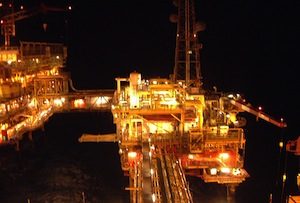 Energy Minister Pedro Joaquin Coldwell told local television the government will change rules that scared off potential bidders earlier this month, when it was able to auction only two of 14 blocks in a pivotal oil and gas tender.
Energy Minister Pedro Joaquin Coldwell told local television the government will change rules that scared off potential bidders earlier this month, when it was able to auction only two of 14 blocks in a pivotal oil and gas tender.
He signaled that the government will relax its requirement that consortia bidding on oil parcels must have one member act as a guarantor and hold shareholder equity of at least $6 billion to protect the state’s interest in the event of a major accident.
“We are revising the issue of the guarantees,” said Joaquin Coldwell in a Tuesday night interview with top Mexican broadcaster Televisa’s cable news channel Foro TV.
He also said the government would tweak rules prohibiting a consortium from selecting a new company to replace a pre-selected operator that pulls out. He said that rule thwarted bids in this month’s auction.
He said the government will also allow companies to make a second bid in auctions if an initial bid fails to meet a government set minimum.
This month’s disappointing auction was the first of a scheduled five-phase auction that will extend into next year for oil regulator CNH.
Joaquin Coldwell, also chairman of the board of state-owned oil company Pemex, said the critical fourth phase covering lucrative deep water acreage in the Gulf of Mexico would be postponed to allow the government and companies more time to pore over details.
“We are conducting a full evaluation in order to launch the deep water call for bids by the end of September and give us more time to perfect the criteria because we shouldn’t have any margin for error on that,” he said.
The oil regulator had previously said the call for bids, followed by the opening of the corresponding data rooms, would be made by the end of this month.
Joaquin Coldwell said the fifth phase, which was to focus on higher-cost shale and other so-called non-conventional oil and gas fields, has been frozen.
“Right now we have suspended it pending a future evaluation,” he said.
The government had previously said that the fifth phase would be trimmed but would still go forward.
Con información de REUTERS
BEGINS A NEW ERA IN THE MEXICO’S ENERGY INDUSTRY
/Our CoreTwo of the 14 shallow-water Gulf of Mexico blocks on offer in the first phase of Mexico’s historic Round One oil auction were awarded, both to a consortium featuring a domestic company.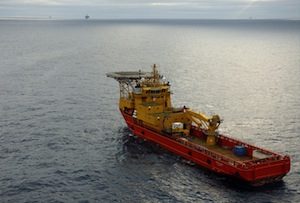
Mexico is starting small with its offer of shallow-water fields and onshore blocks this year and saving the big prizes – deep-water fields in the Gulf of Mexico – for later tenders.
Both of the blocks awarded on Wednesday were won by a consortium made up of Mexico’s Sierra Oil & Gas, Houston-based Talos Energy and Britain’s Premier Oil plc.
One of them covers a 194-sq.-kilometer (75-sq.-mile) area off the coast of the Gulf coast state of Veracruz and is projected to contain light oil and dry gas.
The other covers a 465-sq.-kilometer (180-sq.-mile) area off the Gulf coast state of Tabasco and was contested by four other bidders: Norway’s Statoil, U.S.-based Hunt Overseas Oil Company, Argentina’s E&P Hidrocarburos y Servicios and a consortium made up of Italy’s ENI International and U.S.-based CASA Exploration.
The other 12 blocks either received no bids or had offers that were below the minimum 40 percent of pre-tax profits demanded by Mexico’s Finance Secretariat.
Eighteen individual companies and seven consortia had been pre-qualified for Round One’s first phase, but only nine registered on Wednesday and only seven submitted bids for at least one of the blocks.
The initial batch of 14 Gulf of Mexico blocks – located off the coasts of Veracruz, Tabasco and Campeche states – were placed on offer in the first of five phases of Round One, which comprises a total of 169 onshore and offshore blocks.
The second phase of Round One, in which nine shallow-water fields will be on offer, is scheduled to take place on Sept. 30, while the third phase consisting of 26 onshore blocks is to be held on Dec. 15.
The final two phases of Round One still have no established timetable.
Pemex, which obtained 83 percent of Mexico’s proven and probable reserves and 21 percent of its potential resources in a so-called “Zero Round” of non-competitive bidding last year, said last week it would not participate in the initial phase of Round One.
Mexico’s government is looking to the energy overhaul to attract tens of billions of dollars in investment and reverse a roughly 30 percent decline in Mexico’s oil output, which peaked at 3.38 million barrels per day (bpd) in 2004 and currently stands at roughly 2.3 million bpd.

Latest News
 Breaking Barriers and Building the Future18 March, 2025
Breaking Barriers and Building the Future18 March, 2025 Fundamental factors to strengthen Pemex12 August, 2019
Fundamental factors to strengthen Pemex12 August, 2019 Offshore Project Development: The Road to First Oil26 July, 2019
Offshore Project Development: The Road to First Oil26 July, 2019
